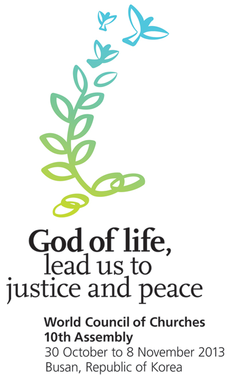Churches seek life, peace, justice and dignity for Africa

African churches celebrate fifty years of the All Africa Conference of Churches at its 10th Assembly in Kampala, Uganda, 2013.
10 June 2013
At the 50th anniversary of the All Africa Conference of Churches (AACC), church leaders from more than forty African countries ask how they can rise up against the shackles of the colonial legacy, conflicts, poverty, class struggles and political upheavals, to unlock Africa's immense potential.
These questions were addressed by more than a thousand church representatives in Kampala, Uganda, at the AACC's 10th Assembly titled “God of life, lead Africa to peace, justice and dignity”, 3 to 9 June.
The focus of the AACC assembly theme correlated with the theme of the World Council of Churches (WCC) upcoming assembly to be held from 30 October to 8 November in Busan, Republic of Korea. The WCC theme is “God of life, lead us to justice and peace.” The Busan assembly will bring together churches from around the world, including Africa.
Speaking on the AACC's vision, Archbishop Valentine Mokiwa, its president, said the AACC was created in 1963 to translate “African spirituality into the social, political and moral transformation of this continent as it was emerging from the bondage of spiritual and mental imperialism and colonization.”
He encouraged African churches to speak out against poverty, calling it a “sin”. He said, “At this assembly we must mark the turning point for the Church in Africa to speak out and act against the sin of poverty. Starting now, the Church must fight poverty by naming and declaring the conditions of the poor as intolerable in our time. We must declare poverty the greatest scandal and sin of our time and age.”
The WCC general secretary Rev. Dr Olav Fykse Tveit echoed these views, acknowledging and encouraging the strong role of the African churches in being “prophetic voices” speaking for justice and peace.
“We know that Africa is a continent rich in resources. Sadly, many of these resources have been exploited, offering little benefit to the sons and daughters of Africa in comparison. The struggle for economic justice for and within Africa must continue and be strongly supported by the global ecumenical movement.”
“The world and the church need the influence of Africa's Christian voices, as we have been strengthened by examples of strong leadership, from women and men, coming from Africa. Neither you nor the world around you can afford to see Africa only as an object of aid. Africa’s experiences of life from the inside are a great source of wisdom and guidance to find justice, peace and dignity,” Tveit added.
Bringing change through women and youth
Prof. P.L.O Lumumba, a presenter from Kenya, emphasized the vital contributions of youth and women in accomplishing the values of peace, justice and dignity. He said the change can occur only when churches in Africa play their rightful role in “re-awakening and re-energizing” of African youth.
“There is no doubt that youth can contribute to lasting peace in Africa, but only if they are at peace with themselves.” Many young Africans have lost their self esteem and seek refuge elsewhere. He continued, a “good number of young people seek salvation by migrating from Africa, and many still find themselves enticed as child soldiers in countries such as Sierra Leone, Democratic Republic of Congo and others.”
Amidst these difficulties, he said, youth must be at the forefront of Africa's renewal, but they can play this role only if they are equipped with the “weapons of self-esteem, courage and dignity”.
Speaking on African women, who constitute more than 50 percent of the regional population, Lumumba added that “if Africa is to know peace and justice her women must be treated with dignity and given the opportunity to serve.”
Sekai M. Holland, co-minister of the Organ for National Healing, Reconciliation and Integration in Zimbabwe, also shared her views on development in relation to the theme of the AACC assembly. She opined that there is no doubt that Africa is faced with enormous challenges, yet Africans have made extraordinary progress.
“Real changes for the better are occurring, democratic reforms have been put in place throughout sub-Saharan Africa, debt relief programmes are being discussed, literacy levels are slowly rising. In the cultural and religious field, African churches have an increasing global voice,” Holland said.
The AACC assembly was also addressed by President Yoweri Museveni of Uganda on 8 June.
Among other speakers were Archbishop Stanley Ntagali, Rev. Suzanne Matale, Prof. John Mbiti, Botshelo Moilwa, Dr Agnes Abuom, Rev. Dr Dietrich Werner, Anthony Kehinde Adebayo and Rev. Dr Konrad Raiser.
WCC general secretary's speech at the AACC assembly
Website of the All Africa Conference of Churches
High resolution photos can be requested via photos.oikoumene.org




